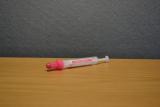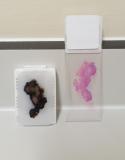Test Directory
MYD88 p.L265P Mutation testing
Containers - Adult

Red Cap Tube EDTA KE 2.7ml
|
Volume Range
5ml peripheral blood, bone marrow specimen or FFPE tissue
Additive per Container
EDTA |

FFPE block / H&E slide / Pathology report
|
|
Laboratory Site
Edinburgh
EH4 2XU
Transport arrangements
Blood and bone marrow specimens should ideally arrive within 24 hours of collection (maximum of 48 hours). There is no time limit for FFPE samples. Samples should be sent to the following address:
Western General Hospital
Haematology/Biochemistry Combined Reception
Immunophenotyping Laboratory
Crewe Road
Edinburgh
EH4 2XU
See also Specimen transportation.
Sample storage arrangements
Samples should be stored at room temperature. See specimen requirements.
How to request
Please refer to our detailed requesting instructions. The HMDS request form can be located here.
Requests for testing FFPE tissue should be sent to the Molecular Pathology Service at RIE with a completed HMDS test request form.
Availability
Monday-Friday 9am-5pm
Anticipated turnaround
Results should be expected within 10 working days. See results.
Static information/disclaimer
All sample with a CLL score <2 via Immunophenotyping will be tested for MYD88 p.L265P mutations via a reflex testing strategy
General additional information
This test uses an allele specific real time PCR for the identification of the MYD88 p.L265P variant to help aid in the differentiation of low grade B Cell lymphoplasmacytic lymphoma (LPL), Waldenström Macroglobulinaemia (WM) and IgM monoclonal gammopathy of undetermined significance (MGUS) from marginal zone lymphomas. The MYD88 p.L265P mutation can also be used to distinguish the different sub-types of diffuse large B cell lyphomas (DLBCL); the L265P mutation being found in activated B cell like DLBCL, but rarely in the germinal centre like DLBCL. See testing.
This test is accredited to ISO 15189:2012
For clinical advice on appropriate investigations and advice for the interpretation of test results, please see contact us.